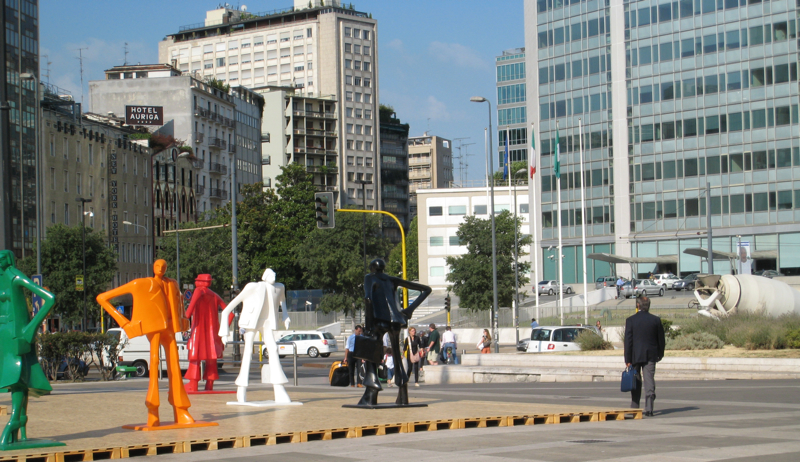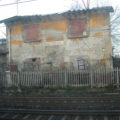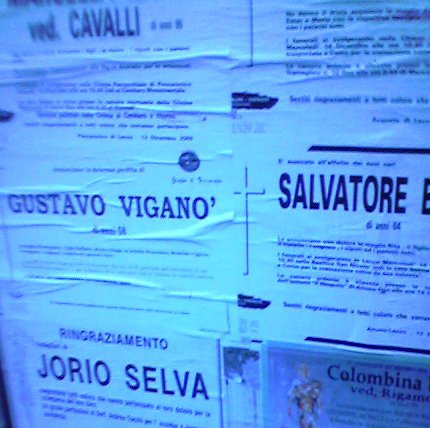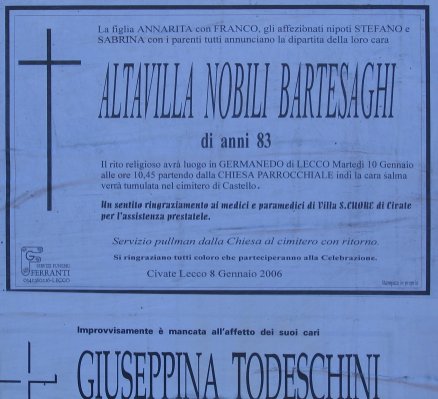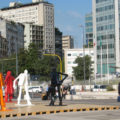Italy is justly renowned for many centuries and styles of stunning architecture. Unfortunately, all the good stuff is at least a century old. Before and after our move to Lecco in 2003 (initially into a rented apartment), we spent over a year looking for a home to buy. Much of what we saw was of recent construction (or still being built), and very disappointing – exterior styles ranged from boring to ugly.
At some point we thought, “Okay, never mind the outside, we’re not going to look at it from the outside much anyway, right?” But we were also baffled by some of the choices made about the insides. In our three-room apartment in Milan, built in the 1950s, each room was at least 3×4 meters (except the bathroom and kitchen). Which was a good thing, because each room had to be mult-purpose: one corner of our bedroom was my office, Enrico’s piano resided in Rossella‘s room, and the refrigerator was in the living room because the kitchen was too small to hold it.
Average room size has decreased over the decades. In the new places we looked at around Lecco, a so-called child’s room was barely large enough for a single bed and a small desk. This is certainly not enough living space for a teenager, and doesn’t seem to take into account the fact that Italian offspring routinely live at home til well into their 20s, or even later. Or is this a parents’ ploy to encourage the kids to leave home?
Some new homes inexplicably wasted stunning locations and views. Most of the townhouse-style condos we looked at were four stories tall, with a garage and family room on the bottom floor (partially built into a hillside), and a slope-ceilinged attic intended as a bedroom. The attic, being on top, would have the best views of the lake and mountains, but usually had only skylights – which give no view at all unless you open one up and poke your head out. (The exception was a top floor apartment that had been redone with great taste by a friend’s parents. They had cleverly placed the skylight so that, lying in bed, you would have a perfectly-framed view of the Medale, a sheer-cliffed mountain looming over Lecco.)
One still-being-built townhouse had a second-floor terrace with a lake view, accessed by a large sliding glass door. One would expect such a view to be enjoyed by a master bedroom or upstairs living room. But no: the terrace opened onto a hall that was too narrow to hold even a writing desk, while the bedrooms at each end were gloomy, with tiny windows. The man showing us the place was deeply offended when I suggested that this was a stupid arrangement; I’ll bet one of his relatives designed it.
And that’s part of the problem. There exists in Italy a professional class called geometra, who attended a professional secondary school to learn the rudiments of designing and constructing buildings, and are legally licensed to do so, for buildings of limited size and complexity; they’re cheaper to hire than real architects. Apparently the geometra courses do not mention aesthetics, a lack which shows in the houses they design: boxy and unimaginative at best, downright ugly at worst, so that “casa del geometra” has become an epithet for any dwelling that is unpleasant to look at.
In all our peregrinations we did see a few beautiful houses, probably designed by architects to the owners’ specifications. I loved some of these, but they weren’t for sale. After months of increasingly despairing searches, we saw a place that, though only four years old, was designed (I don’t know by whom) with intelligence and style: big windows and terraces to make the most of the view, including a huge dormer window in the attic room (mansarda), looking out on Lake Como and the surrounding mountains. We walked through the house for ten minutes, looked at each other, and said: “This is it.” And it is.

